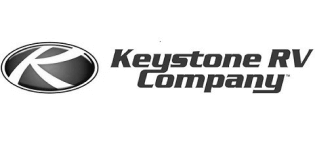Camper Trailer
Get Started Now With Us!
Get Started NowExperience the Great Outdoors (in comfort) with Camper Trailers
Known by various names such as “pop up trailer” and “tent trailer,” camper trailers encapsulate the essence of camping while delivering the convenience associated with traditional trailers. Their primary distinction is their pop-up structure.This feature renders them the lightest trailers in the market. Camper trailers represent a dynamic and practical choice for outdoor enthusiasts who seek to seamlessly blend comfort with outdoor adventure.They fuse the comforts of a trailer with the rugged essence of a tent. These versatile units offer a unique camping experience that resonates with a diverse range of individuals and families.
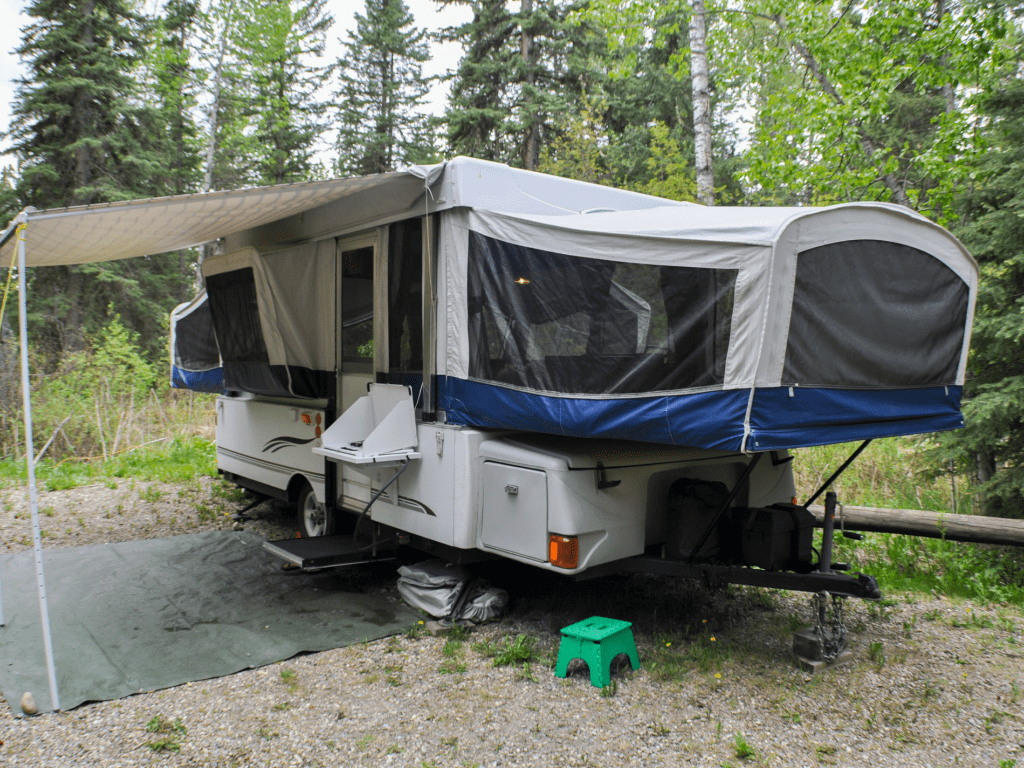
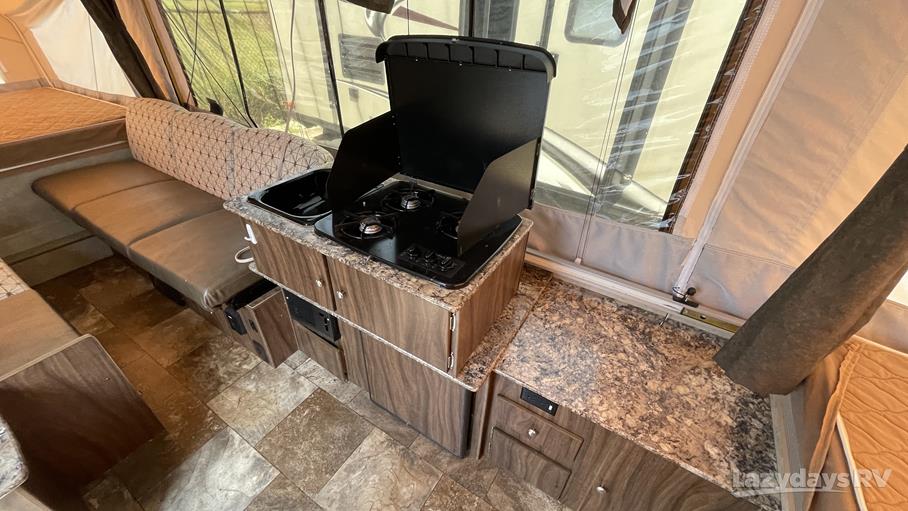
Striking a Harmony between Comfort and Camping
The camper trailer’s ability to strike a balance between comfort and connection with nature stands as one of its primary advantages. It offers the conveniences and amenities of a traditional trailer while retaining the adventurous spirit of camping. Camper trailers are compact for easy towing on the road, yet they unveil spacious living areas once you reach your destination and pop it up. This versatility makes camper trailers suitable for various camping sites. Whether your preference leans toward enjoying modern comforts in a cozy interior or immersing yourself in nature’s embrace, camper trailers provide a distinct camping experience that strikes a harmonious compromise to cater to a wide array of outdoor enthusiasts.
CAMPER TRAILER
Features
Designed for a back-to-basics camping experience, camper trailers are intentionally equipped with minimal amenities, offering a unique opportunity to immerse yourself in nature. These trailers prioritize simplicityallowing you to embrace outdoor living more closely than any other type of trailer. With a focus on essential comforts and a pared-down approach, camper trailers invite you to disconnect from the modern world and fully embrace the beauty of your surroundings.
Compact Design
Camper trailers are designed to be compact and lightweight, making them easy to tow and maneuver, even with smaller vehicles. Plus They take up a lot less room when it comes to storage.
Foldable Construction
Many camper trailers feature foldable components, such as pop-up roofs or expandable sides, allowing for increased interior space when parked. This also lends itself to increased visibility when towing it.
Sleeping Accommodations
Camper trailers often have comfortable sleeping areas, which can include fold-out beds, bunk beds, or convertible seating arrangements.
Basic Amenties
Camper trailers typically feature fundamental amenities like kitchenettes and bathrooms. Although not as extravagant as certain other trailers, they offer a balance between comfort and the rugged charm that defines camping’s appeal to many.
Utility Connections
Some camper trailers offer utility connections for water, electricity, and propane, allowing you to enjoy modern conveniences even when camping off the grid.
Off-Road Capability
Many camper trailers are built to handle off-road terrain, equipped with sturdy suspension and tires that make them suitable for exploring remote destinations.
Storage Options
Despite their compact size, camper trailers often provide storage solutions like cabinets, drawers, and compartments to keep camping gear organized.
Connection with Nature
With their simplified amenities and a closer connection to nature, camper trailers offer a more intimate and immersive camping experience, perfect for those who want to truly unwind and detach from the daily hustle and bustle.
CAMPER TRAILER
Towing Requirements
Towing a camper trailer requires a suitable vehicle with the right towing capacity and compatible trailer hitch size:
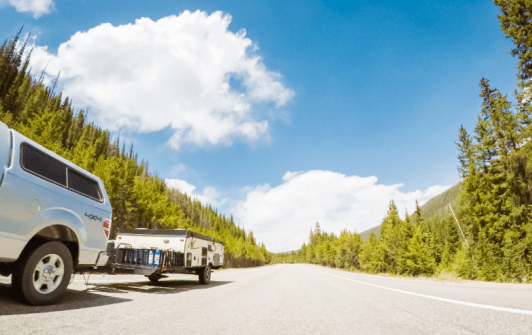
Vehicle Type: Camper trailers are commonly towed by SUVs and light trucks due to their robust build and higher towing capacities. Opt for models with towing packages or factory-installed towing capabilities to ensure enhanced towing performance.
Trailer Hitch Size: To tow a camper trailer effectively, you require a trailer hitch that aligns with the towing capacity and specifications of both your vehicle and the trailer. For most camper trailers, a Class III or Class IV hitch proves sufficient.
For a safe towing experience, refer to your vehicle’s manual or reach out to the manufacturer for recommended towing capacity and hitch class. Consulting professionals or mechanics can help confirm your vehicle’s suitability for towing, ensuring compatibility between your vehicle and the camper trailer.
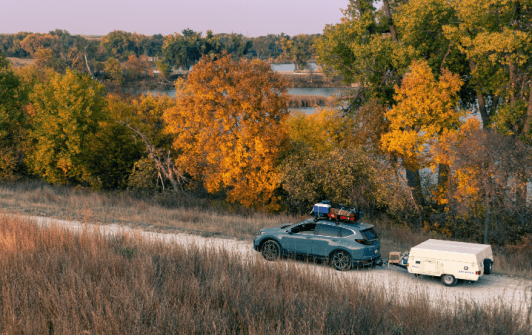
CAMPER TRAILER
Amenities
Travel trailers come equipped with a range of amenities designed to elevate your camping adventure. The interior typically features sleeping areas, a functional kitchenette with cooking facilities, a bathroom with toilet and shower, and a dedicated dining space. Many models also include amenities such as air conditioning, heating systems, entertainment options, and ample storage solutions.
Compact Kitchenette
Camper trailers usually feature a compact kitchenette with essentials like a stove, sink, and small refrigerator, enabling you to prepare meals comfortably.
Convertible Dining Area
Many camper trailers have a convertible dining area that can also be transformed into a sleeping space, providing more accommodation options while maximizing the use of space.
Comfortable Sleeping Quarters
Camper trailers often offer cozy sleeping areas with fold-out beds, bunk beds, or convertible seating arrangements or canvas pop out beds. This ensures a comfortable night’s rest compared to a tent.
Basic Bathroom
Some camper trailers include basic bathroom facilities, such as a portable toilet or a wet bath, providing some convenience during camping trips.
Storage Solutions
Despite their size, camper trailers are still designed with storage in mind. They usually feature cabinets, closets, and storage compartments to keep your belongings organized, although they may not have as much space as trailers with taller solid frames.
Outdoor Awning
Many camper trailers come equipped with an outdoor awning, providing shade and shelter from the elements. This enhances your living space by expanding it to the areas outside your trailer.
Electrical Hookups
Camper trailers often have electrical hookups that allow you to connect to campground power sources, enabling the use of appliances and charging devices.
Heating and Cooling Options
Even though they are the most basic trailers, some models of camper trailers can include heating and cooling systems, ensuring a comfortable interior temperature regardless of the weather.
Pros
- Flexibility and Convenience: Pop-up tent trailers provide a balanced blend of mobility and comfort, enhancing the camping experience for those seeking ease and flexibility.
- Lightweight Towing: Pop-up tent trailers are notably lightweight and have a low profile, rendering them suitable for towing with a wide array of vehicles, thus expanding the options for adventurers.
- Adaptable Living Spaces: When fully set up, pop-up tent trailers offer a versatile living space, accommodating families and groups with ample room to relax.
- Budget-Friendly Options: Pop-up tent trailers often present a more economical choice in comparison to larger, fully equipped travel trailers, catering to budget-conscious campers.
Cons
- Setup Complexity: Pop-up tent trailers demand a level of effort and time for setup and takedown due to their expandable sections, requiring proper extension and securing.
- Seasonal Limitations: The nature of expandable sections might entail reduced insulation and protection during colder months, limiting their utility in off-season camping.
- Limited Storage: While pop-up tent trailers can provide ample living space when expanded, they often offer less storage capacity compared to larger travel trailers and hybrid trailers.
LEARN MORE
Travel-Mor Camper Trailers FAQs
- How do camper trailers differ from other types of trailers like travel trailers and hybrid trailers?
- Camper trailers, also known as pop-up or tent trailers, differ from other trailers in their construction and amenities. They feature foldable components that allow for a compact towing profile and a closer connection to nature. While they offer basic amenities, they prioritize simplicity and lightweight design, distinguishing them from larger travel trailers and hybrid trailers.
- What maintenance tasks are essential for keeping a camper trailer in good condition?
- Maintenance tasks for camper trailers include regular inspections of foldable components, such as pop-up roofs and expandable sides, to ensure they are functioning correctly. It’s crucial to check seals, hinges, and canvas materials for any signs of wear or damage and perform routine cleaning to prevent issues.
- How should I winterize my camper trailer to protect it during colder months?
- Winterizing a camper trailer involves ensuring all foldable components are fully dry and free of moisture to prevent mould and mildew growth. Additionally, it’s essential to check seals and canvas materials for any gaps or tears that could allow cold air or moisture to enter the trailer.
- What type of towing vehicle is suitable for pulling a camper trailer?
- SUVs and light trucks are commonly used for towing camper trailers due to their robust build and higher towing capacities. Look for vehicles equipped with a towing package or factory-installed towing capabilities to ensure optimal towing performance.
- Can any SUV or light truck tow a camper trailer, or are there specific requirements?
- While many SUVs and light trucks can tow camper trailers, it’s essential to check the vehicle’s towing capacity and ensure it aligns with the weight of the trailer. Additionally, a suitable trailer hitch matching the towing capacity and specifications is necessary for safe towing.
- What are some common issues that camper trailer owners may encounter during use?
- Common issues with camper trailers may include problems with foldable components, such as pop-up roofs and expandable sides, as well as issues with canvas materials, seals, hinges, and plumbing systems. Regular maintenance and proper usage can help prevent these issues.
- Are camper trailers suitable for long-distance travel, or are they better for short trips?
- Camper trailers are versatile and can be used for both short weekend getaways and longer camping trips. Their lightweight design and compact towing profile make them suitable for various types of trips, accommodating different travel preferences.
- How do camper trailers handle extreme weather conditions, such as high winds or heavy rain?
- While camper trailers are designed to withstand typical weather conditions encountered during camping trips, it’s essential to take precautions in extreme weather. Securing pop-up roofs and expandable sides, as well as using awnings and tarps, can help protect the trailer from high winds and heavy rain.
- Can camper trailers be customized to fit specific needs or preferences?
- Yes, camper trailers come in various sizes and configurations, allowing for customization to suit individual preferences and camping requirements. Some manufacturers offer options for additional amenities, such as upgraded kitchenettes or bathrooms, to enhance the camping experience.
- What are the advantages of choosing a camper trailer over other types of recreational vehicles for camping trips?
- Camper trailers offer several advantages, including a lightweight design for easier towing, compact storage when collapsed, basic amenities for comfort during camping trips, and a closer connection to nature. Additionally, they often come at a more budget-friendly price point compared to larger travel trailers and motorhomes.
RV Sales & Storage In Ottawa
The camper trailer offers an enchanting camping alternative, blending the comfort aspects of an RV with the simplicity of a pop-up camper. The tent trailers’ versatile layout, easy towing, and snug amenities, make it an excellent choice for individuals seeking a balance between adventurous outdoor journeys with a degree of extra comfort. Whether you’re a family seeking a spacious and cozy camping experience or an adventurous soul desiring the flexibility to explore diverse destinations, the camper trailer is an excellent travel companion to choose.



